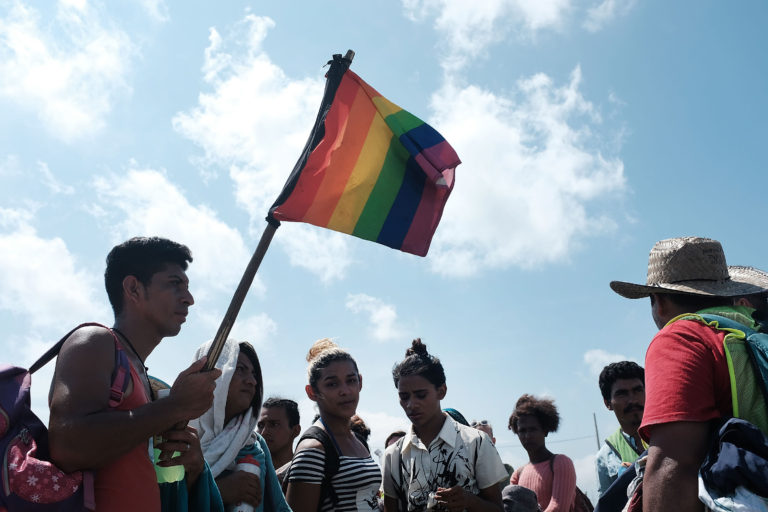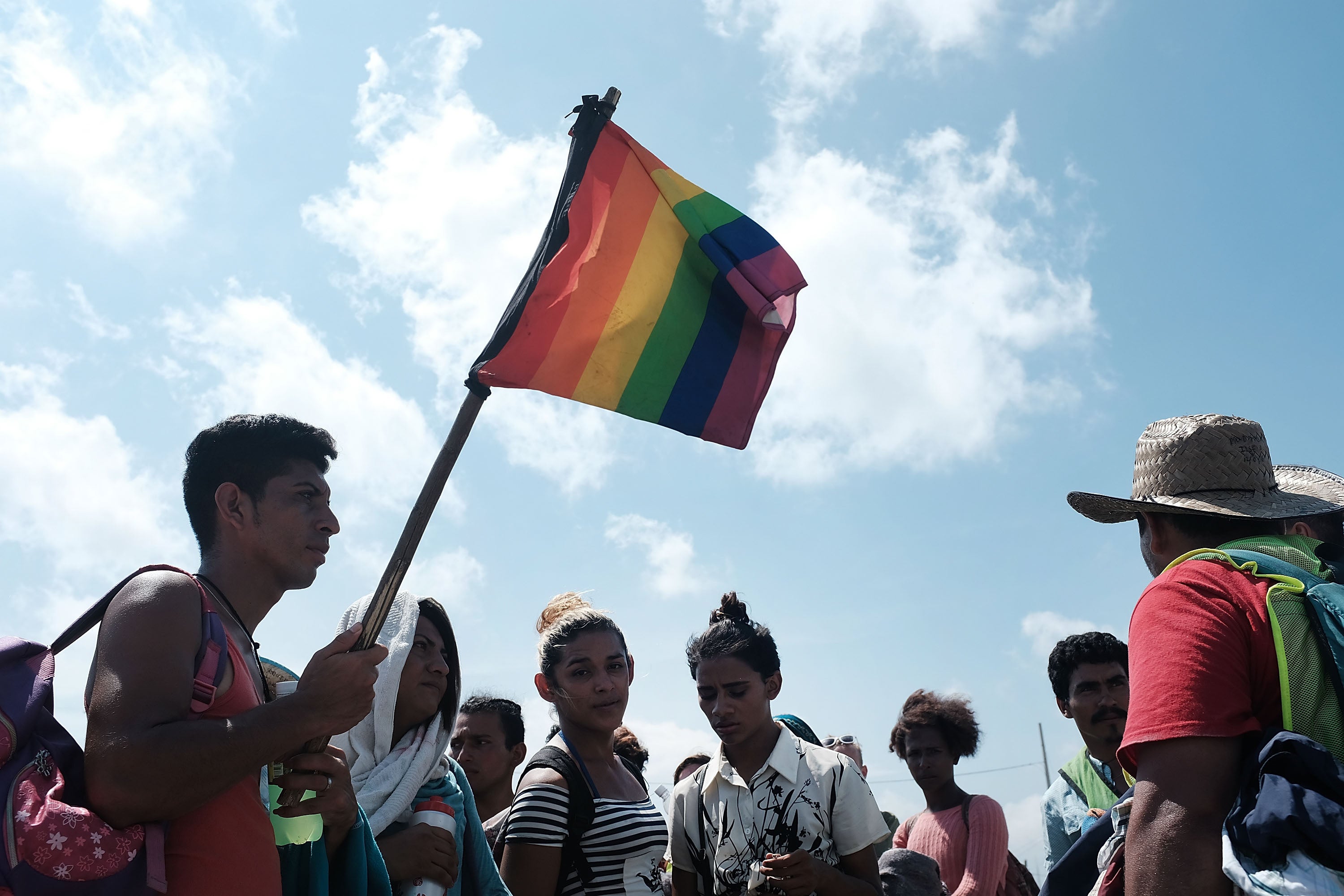

Lesbian, gay, bisexual, and transgender (LGBT) people from Honduras, El Salvador, and Guatemala, sometimes called the Northern Triangle, often face violence and discrimination from their families, gangs, and even the police. When they try to seek asylum in the United States, they are met with obstacles that prolong their suffering. Philippa H Stewart spoke to Neela Ghoshal about her new report, “Every Day I Live in Fear,” which looks at what needs to happen so LGBT people from the Northern Triangle can live safely, whether at home or in the United States.
Why did you look at these countries?
The Northern Triangle of Central America has among the highest reported rates of murders against LGBT people in the world. El Salvador, Honduras, and Guatemala are also the three countries with the highest rates per capita of LGBT asylum seekers arriving in the United States.
While none of the Northern Triangle countries criminalize homosexuality, the governments are failing to protect LGBT people, and in some cases are adopting policies that make their lives more difficult.
What kind of policies?
None of the countries allow transgender people to change their names and gender markers on their official documents. In several cases we documented, police assaulted or harassed trans people after seeing their IDs.
None of the countries have passed comprehensive, civil nondiscrimination provisions, which are essential tools to prevent and address discrimination. If you are discriminated against because of your gender identity or sexual orientation in employment or housing, you don’t have grounds for a civil claim.
Honduras and El Salvador do have laws that qualify certain types of crimes as hate crimes – but, as far as we know, no one has ever been convicted of a hate crime against LGBT people.
The United States is a destination for asylum seekers fleeing Central America. How does being LGBT play into this?
Increasingly restrictive Trump administration policies toward asylum seekers are hurting people from the Northern Triangle – including LGBT people escaping severe violence. Many LGBT people are not safe at home, and the US, in doing everything it can to keep asylum seekers out, is shutting off what for many is the only immediate path to safety. In some cases, the United States is literally putting people at risk of being murdered by sending them home. One trans woman, Camila Díaz, was deported from the US in late 2018 and murdered by Salvadoran police in early 2019.
What do LGBT people in these countries face?
Many are the victims of family violence.
One person from El Salvador said her father tried to essentially drown her in a water basin where you wash clothes when she started expressing a feminine gender identity. A trans woman in Guatemala said her mother threw a hot iron at her. She ended up hospitalized.
Governments need to help change social attitudes and help families accept their LGBT children and also make sure people who commit violent offenses are held accountable, which currently isn’t happening.
What other violence do they face?
There is violence from gangs and from law enforcement.
Street gangs are powerful and target LGBT people, partly out of anti-LGBT hate and also because they know LGBT people rarely have a support network. If a gang is trying to extort “rent” from an LGBT person, that person often can’t go back to their parents’ house, for example, because their family doesn’t accept them.
Another problem for trans people in particular is that they’re very visible. One woman in El Salvador, Erika, saw gangs kill four people in her neighborhood. They came to her and said: “If you tell anyone you’re dead.” Erika is a 6-foot-tall trans woman. She couldn’t think of anywhere that she could go where she would be out of their reach.
According to Guatemala’s human rights ombudsperson’s office, at least 20 LGBT people have already been killed there in 2020. In El Salvador, at least seven trans women and one gay man were killed between October 2019 and March 2020.
You also mentioned police violence.
In several cases we documented, police stopped people on the streets and physically or sexually assaulted them after realizing they were LGBT.
Raya, a trans woman in Guatemala City, saw police aggressively detaining a man. They became angry that she was watching, pushed her onto to the ground, violently opened her legs, and shouted at her: “You’re a man!”
There’s a case in El Salvador of a trans man called Aldo Peña who was a municipal police officer. He was attacked by the national police and beaten so badly that he told us “I thought it was my last day to live.”
He was the only person we interviewed who successfully filed a complaint for police violence, which he was able to do because of his social position and the support of LGBT organizations. Two of his attackers ended up going to prison for violent assault. The following month, El Salvador passed hate crimes legislation – but in the five years since, hasn’t convicted anyone of a hate crime.
Why do LGBT people from the Northern Triangle decide to go to the US?
Many people tried to stay in their home countries even after facing violence, but there were so many cases of police saying “well you were asking for it” when they tried to file complaints. The violence and lack of protection becomes too much for them to bear.
Pricila, a trans woman from El Salvador, had dealt with police violence and ongoing extortion from gangs for years. She saw her gay friend get abducted by a gang, who came to her house and said: “You’ll be next.” She left that night.
Carlos, a gay man from Honduras, only left after being attacked twice by gangs. He didn’t trust the police, who had sexually harassed him in the past because he was gay.
What kinds of challenges do they face when they reach the US?
In March 2020, the US government closed off its borders to the vast majority of asylum seekers. This was on the pretext of the Covid-19 pandemic, but under international law the need to respond to Covid-19 cannot obliterate the right to claim asylum.
People that we interviewed in Tijuana, Mexico, in January of this year are still waiting there now and have no idea if they will ever be able to enter the US to seek protection.
What was the situation before Covid-19?
Under the Trump administration, when LGBT asylum seekers got to the US border, they hit a series of obstacles designed to deter people from seeking asylum, force them to stay in Mexico, or to give up and go back home.
The first of these is called “metering.” You put your name on the list and if your name is called you present yourself to Customs and Border Protection (CPB). Even then CBP regularly turns asylum seekers away. People have spent months waiting for their names to be called. This tactic deters people from claiming asylum.
Even if your name does get called and you undergo a “credible fear” interview, the “Remain in Mexico” program forces many asylum seekers to wait in Mexico until they get a decision.
Also for some Honduran and Salvadoran asylum seekers, once they enter the United States, immigration officials load them onto a plane to Guatemala and tell them to seek asylum there.
These things seem to affect everyone, what’s different for LGBT people?
Living in limbo in Mexico for months is particularly hard for LGBT people. Work opportunities aren’t great for anyone, but straight or cis-gendered people have got some opportunities for casual labor. For trans people, that is almost impossible.
If Honduran and Salvadoran LGBT people are sent to Guatemala, they are also at risk of anti-LGBT violence. Recently, a Salvadoran trans refugee was killed there.
Is Covid-19 the only reason things are getting harder now?
A new US policy under consideration would force people to tell an immigration judge that being LGBT is why they are seeking asylum during their very first hearing. If you don’t, you lose the opportunity to have that considered as part of your claim.
Wouldn’t most people do that?
Many LGBT people appearing before an immigration judge are terrified. Not only that, their lives may have depended on being entirely closeted. It may be a massive leap to then immediately reveal their sexuality or gender identity before a judge.
What is the most important thing the US needs to do?
The United States needs to reverse all policies that restrict the right to seek and enjoy asylum that have been implemented in the last few years.
What can the Northern Triangle countries do?
Governments in all three countries should be serious about prosecuting hate crimes, and allow trans people to change their gender markers on their documents. Crucially, they should also pass civil nondiscrimination laws and policies, and address the social stigma around being LGBT. Everyone should be able to live safely in their own country.